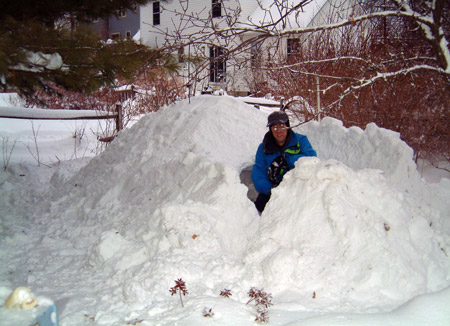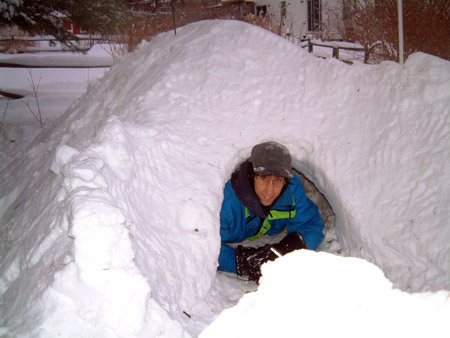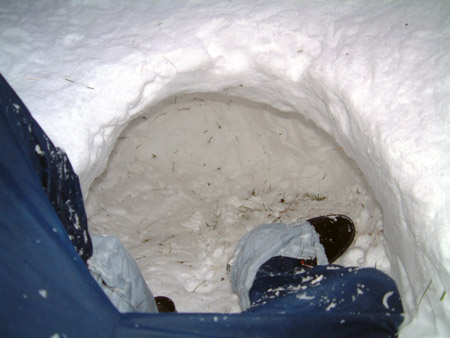|
|
Home →
Survival →
Shelter →
Snow
Snow Shelter
by Mike Hurg |
| |
| This year after receiving our first measurable winter snow here in Connecticut, I made my
first attempt at building a snow shelter. I decided that a snow mound would be the best idea as
we seldom get more then 12 inches of snow at any one time. I used a few books and this site as a
resource and realized doing this by myself would be quite a task. |
| |
|

photo by Mike Hurg
|
I started with about eight inches of light fluffy snow on the ground and began to shovel snow
into a mound. As many mention, this in itself will cause several issues which could cause
problems in a real survival situation.
First and foremost is the sweat caused by working so hard,
and second the fatigue. I also had underestimated how much snow it would take. I soon found it
takes a fair amount of snow to make an adequate mound.
I then decided to use all the tools I had
at my access as this was an experiment and I was working in my backyard. My snow blower was just
the help I needed! In no time I had a mound about five feet high and ten feet or so in
circumference.
I compacted the snow as best I could using my feet, a snow shovel, some small
pieces of plywood and laying my whole body on the sides as I saw on this site! Then I let it sit
for several hours. |
|
| When I started to remove snow from the mound I was surprised to find the consistency of the snow had changed.
Previously the snow had been light and fluffy and now after some compacting and settling it was more dense and actually
held form when carved into. As I shoveled out load after load, I was again becoming hot even though it was about 10
degrees out! By the time I removed enough snow to fit one person cramped in, I was shot.
I estimate it took about two
hours (even with the aid of the snow blower) to pile and pack the snow. Then to remove the snow for a meager one person
space and to shape the ceiling and sides took another two hours. Granted this was my first time and as most books say,
this is not a feasible shelter for one person to construct in a hurry. |
|

photo by Mike Hurg
|
I was also amazed at how much snow you have to remove from a mound to create adequate
space. The height of the mound was something I also under estimated. Sitting cross legged it
takes quite a bit of height to obtain headroom to sit up comfortably. This is something I was not
able to obtain on my first try.
I was very worried about cave ins so I chose to be very cautious
about the ceiling thickness. I think I kept them to thick and could have removed more.
While I was removing the snow I tried to make a small vestibule outside the shelter to keep the
wind away from the door. It worked well but i wished i used it to make second mound with tunnel
as I later saw recommended here by another contributor here. |
|
|

photo by Mike Hurg
|
Making a snow shelter is an excellent idea to try close to home at first to get an idea of what
it takes to construct one. You can work primitively or you can use whatever tools you have, its
up to you.
I found the time I spent outside working on the snow shelter to be rewarding and fun.
My shelter survived a few days of rain, and one day of 60+degree temperature, though the inside
sagged considerably.
I used the now frozen shell as the bones of my second snow shelter attempt
which I am still working on but all ready functions twice as good as my first. More on the second
shelter next time. |
|
| |
|
|
|
|